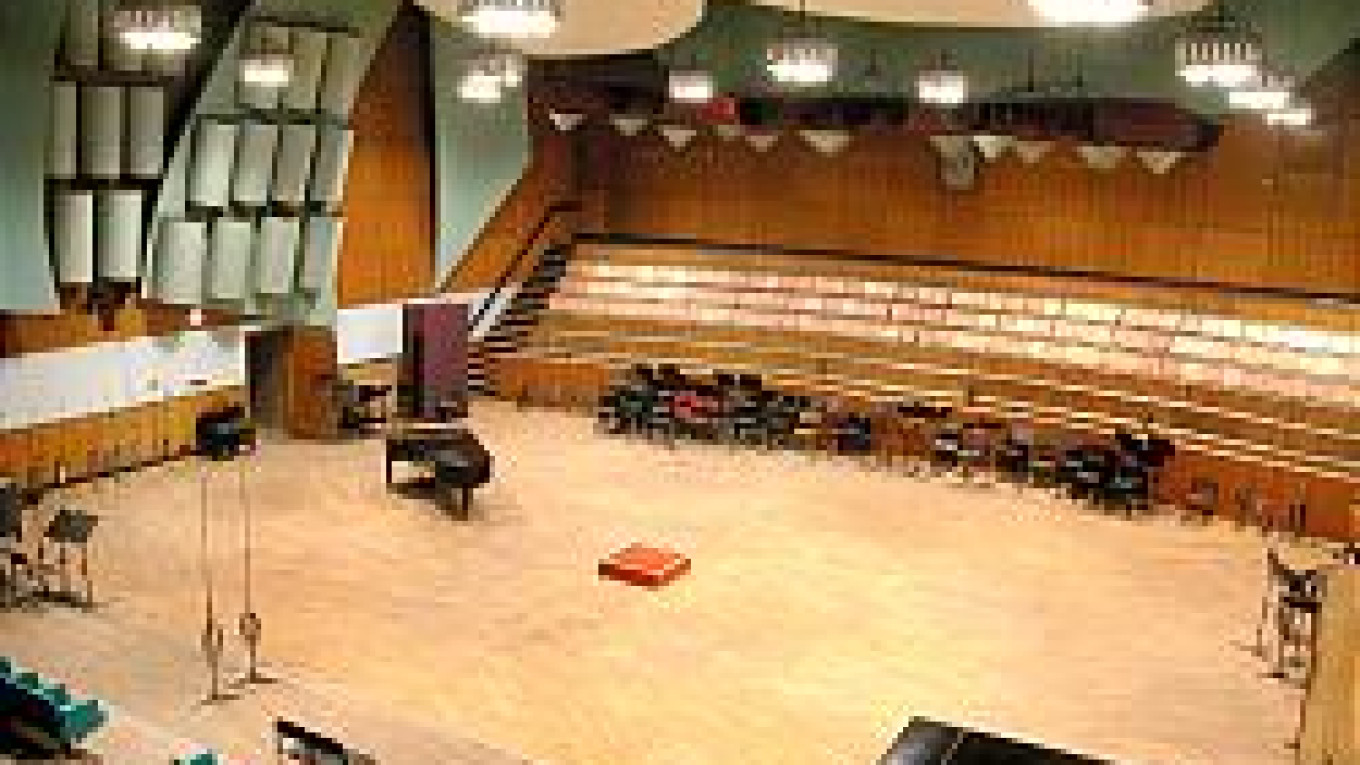It was in the studios at 24 Ulitsa Kachalova, as Malaya Nikitskaya was known in Soviet times, that operas, symphonies and radio plays were recorded and broadcast around the world.
In these acoustically perfect studios, the biggest in Europe, one of the fathers of the Soviet school of conducting, Alexander Gauk, led the Grand Symphony Orchestra of All-Union Radio in the 1950s. Later, his students Alexander Melik-Pashayev and Yevgeny Svetlanov conducted exemplary recordings of Mussorgsky, Tchaikovsky and Prokofiev, while Gosteleradio's several choirs and soloists had to fill a 30 percent quota for Soviet music with hymns to Lenin, the Communist Party and the Motherland.
Until several months ago, the underpaid and aging present-day staff was likely lamenting the collapse of the Soviet system of state-sponsored arts, manifested so vividly in the decay of the State House of Radio Broadcasting and Audio Recording, or GDRZ. The plaster is peeling in both of its buildings, one built in the 1930s and the other in the 1960s, and the equipment is worthy of a museum or a dump.
With the rights to its entire archive of musical recordings sold to an American in the early 1990s, the once mighty system of cultural and educational radio has been reduced to one barely audible UHF station, Orfei, or Orpheus.
The emergence of more modern sound studios such as the ones at Mosfilm took away most of the commercial audio business, leaving GDRZ's studios mostly as just rehearsal space for orchestras that are no longer part of the television and radio system. To pay even the meager salaries of its sound engineers and technicians, GDRZ rented out office space to anyone from fuel companies to dentists.
But recently, the mood in the building has changed dramatically. Since March, millions of dollars have been pumped into GDRZ and millions more are budgeted to once again make the studios state of the art.
"We had no hope that GDRZ would ever be revived," said its director Ivan Leonov, who has overseen the studios since 1990. "But we had luck."
The luck came in a decision by the Press Ministry and the fully state-owned VGTRK television and radio holding to merge GDRZ with VGTRK's previously homeless Kultura television channel and pump in some of the advertising revenues of the Rossia channel, formerly called RTR.
A new body was created called Kultura State Television and Radio Co., and Alexander Ponomaryov -- former general director of TV6 who was forced out in spring 2001 as Yevgeny Kiselyov's team took over Boris Berezovsky's station -- was appointed to head it.
VGTRK officials were glowing with pride and enthusiasm as they led a group of reporters through the revamped parts of the building last week. Two small radio studios have been completely re-equipped and transformed into television studios, which allowed Kultura to move all its operations to Malaya Nikitskaya earlier in November.
Kultura's video archives were neatly arranged on freshly built shelves in air-conditioned spaces behind heavy hermetic doors, and the editing rooms have new monitors and control panels. Kultura is thus becoming the first state channel to switch entirely to digital recording and broadcasting.
"Everything is being done here in a smart way, the way it should be," said VGTRK chairman Oleg Dobrodeyev.
 Mike Solovyanov / MT The GDRZ sound studios on Malaya Nikitskaya Ulitsa. | |
In addition to Kultura's state budget funding, Dobrodeyev said Rossia transferred $16 million out of its advertising revenues to Kultura this year and expected to give more next year.
About $9 million has been spent on studio hardware and the building's partial refurbishment, Leonov said. Money also has been spent, VGTRK officials said, on renting satellite transponders, acquiring transmitters in the Far East and other remote areas that had not received Kultura's signal, and on new programming, which allowed the channel to boost its national ratings.
One consequence of the merger between Kultura and GDRZ is a new approach to sound in television. "When our sound engineers looked at the sound used on television, they were shocked," Leonov said. A switch to digital broadcasting will allow Kultura to begin enhancing the quality of the sound it transmits. A mobile television unit the company bought this year in Finland is the only one of its kind in Russian television, he said. It allows for the recording and broadcasting of surround sound in the 5.1 format used in so-called home theaters, with five tracks and an additional sound track for low frequencies.
But this is only the beginning of the new management's ambitious plan to create a cultural media mini-holding within VGTRK. Ponomaryov said he wants to win an FM frequency next year to launch Kultura radio. But perhaps of even greater importance is his plan "to revive the national sound recording capability."
"For 12 years [since 1990] not a single recording has been added to the state archives," Ponomaryov said. "That means that during this time some orchestras have emerged and disappeared, some great musicians have died, but this period is simply absent from history."
A more distant goal, Ponomaryov and Dobrodeyev said, is getting back the rights to the Soviet-era archive.
In October 1992, Gosteleradio's successor Ostankino sold exclusive world rights to the state music archives to little-known, Russian-American businessman Tristan Del, previously called Arkady Shindelman, who had set up the Los Angeles-based company USSU Arts Group for that purpose. The contract was for seven years, but because of a vague clause it was interpreted as binding in perpetuity. The New York Times reported the deal under the headline "The Contract of the Century."
It remains unclear how much Del paid for the archives, which date back to 1930 and include recordings of Dmitry Shostakovich playing his own compositions and Van Cliburn's winning performance at the Tchaikovsky Competition in 1958.
The shady deal caused a scandal. The Culture Ministry and a group of musicians led by pianist Nikolai Petrov protested, calling Del and his colleagues "pirates" in a letter published in Russian newspapers in 1993. Del sued Culture Minister Yevgeny Sidorov and Petrov for $1.5 each for libel -- they later settled out of court -- and has kept control of the archives. In 1996, Western record companies began producing discs with Russian music bought from Del.
"Twelve-hundred hours of old recordings are restored and distributed around the world," Ponomaryov said. "It's our performers, our recordings, but we don't see them."
The new Kultura management and Press Minister Mikhail Lesin, who has championed the Kultura reform project, realize that the Soviet-era recording assets -- whether the archives or grandiose studios -- could bring substantial prestige and profit if brought up to date.
The historically important studios No. 1, built in the 1930s, and No. 5, built in the 1960s, both have separate foundations within their respective buildings. They also are insulated from the rest of the building by thick double walls made of brick, a construction known as "a box within a box."
Ponomaryov said that to build a modern studio of similar size and characteristics to the 600-square-meter Studio 5 would cost about $65 million. It would be much cheaper to re-design the existing studios and fill them with state-of-the-art equipment.
U.S. architectural and acoustical design firm Walters-Storyk Design Group, which recently built two 5.1 digital audio recording, editing and mixing suites for New York public television station Thirteen/WNET, won a tender for a $1.5 million contract to redesign GDRZ's Studio 3 next year. The studio, intended for recording radio plays, will also serve as a pilot project for the much grander plans of refurbishing Studio 1 and Studio 5, Leonov said.
"Acoustics are an expensive thing," he said. "Each studio is like a violin. To me, it seems like huge money, but Ponomaryov doesn't think so. We want to do it well, so that it is known around the world that recording in GDRZ's Studio 5 is world class."
Whereas today recording in Studio 5 costs 2,000 rubles ($62) per hour, managers calculate that after refurbishment they could charge $600 per hour and get plenty of customers from around the world. Reconstruction of Studio 5 would cost about $4 million, Leonov projected. It has the capacity to seat an orchestra and a choir, and an audience if necessary.
But if Studio 5's wooden interior is redesigned, won't the spirits of the great Russian musicians be driven from their old familiar home.
"No," Leonov said. "There is plenty of space for them to hide in between the walls
A Message from The Moscow Times:
Dear readers,
We are facing unprecedented challenges. Russia's Prosecutor General's Office has designated The Moscow Times as an "undesirable" organization, criminalizing our work and putting our staff at risk of prosecution. This follows our earlier unjust labeling as a "foreign agent."
These actions are direct attempts to silence independent journalism in Russia. The authorities claim our work "discredits the decisions of the Russian leadership." We see things differently: we strive to provide accurate, unbiased reporting on Russia.
We, the journalists of The Moscow Times, refuse to be silenced. But to continue our work, we need your help.
Your support, no matter how small, makes a world of difference. If you can, please support us monthly starting from just $2. It's quick to set up, and every contribution makes a significant impact.
By supporting The Moscow Times, you're defending open, independent journalism in the face of repression. Thank you for standing with us.
Remind me later.


